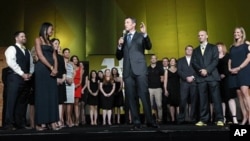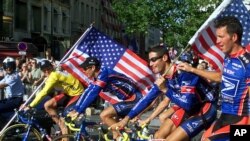Bicycle racing's world governing body, the International Cycling Union, has stripped star American cyclist Lance Armstrong of his seven Tour De France titles and banned him for life, ratifying the sanctions imposed by the U.S. Anti-Doping Agency two months ago.
Though Lance Armstrong has denied it for years, the evidence was overwhelming that he had used illegal performance-enhancing substances to help him win a record seven-straight Tour De France titles from 1999-2005.
The International Cycling Union says it agreed to the penalties levied on Armstrong by the U.S. Anti-Doping Agency after reviewing USADA's 1,000-page report of evidence uncovered in its investigation of the 41-year-old retired cyclist.
UCI president Pat McQuaid announced the decision Monday at a news conference in Geneva.
"This is a landmark day for cycling. Cycling has indeed endured a lot of pain as it has absorbed the impact of the USADA report," he said.
That report included testimony from 11 former teammates that revealed Armstrong not only used banned performance-enhancing drugs, but he also pressured his teammates to use them and bullied those who tried to go against him.
When USADA released its lengthy report two weeks ago, its chief Travis Tygard had these remarks.
"Their stories are sad and they are chilling, but they are overly powerful," said Tygard.
USADA labeled it "a massive fraud now more fully exposed." Tygard said USADA learned that Armstrong and the cycling teams he led used the blood booster EPO, testosterone, corticosteroids and transfused blood.
"It paints an undeniable web of, unfortunately, the deepest and the most sophisticated professionalized drug program that we have ever seen a team run," he said.
But there is no mistaking that Armstrong and his teammates were not alone. Nearly all of the cyclists from other teams who stood on those seven Tour de France podiums with him have been tainted with charges of illegal drug use, as were many others who competed against him through the years.
McQuaid said it is a culture he has been committed to fight since becoming UCI president in 2005.
"Cycling's changed a lot since then. What was available to the UCI at that time to confront situations like this was much more limited, compared to what is there now. And if we had the [drug testing] tools which we have now available to us, this sort of activity would not go on," said McQuaid.
McQuaid said he believes that as tainted as it has been, the sport of cycling has a future.
"This is not the first time cycling has reached a crossroads, or that it has had to begin anew, and to engage in the painful process of confronting its past. It will do so again with renewed vigor and purpose, and its stakeholders and fans can be assured that it will find a new path forward," said McQuaid.
Last week Armstrong lost a number of high-profile sponsors in response to the USADA report, and he resigned as chairman of Livestrong, the charity he founded more than a decade ago to raise money for cancer research after surviving testicular cancer.
Armstrong has not yet responded to UCI's decision. The International Olympic Committee has yet to announce whether it will strip Armstrong of the cycling time-trial bronze medal he won at the 2000 Sydney Summer Games.
Though Lance Armstrong has denied it for years, the evidence was overwhelming that he had used illegal performance-enhancing substances to help him win a record seven-straight Tour De France titles from 1999-2005.
The International Cycling Union says it agreed to the penalties levied on Armstrong by the U.S. Anti-Doping Agency after reviewing USADA's 1,000-page report of evidence uncovered in its investigation of the 41-year-old retired cyclist.
UCI president Pat McQuaid announced the decision Monday at a news conference in Geneva.
"This is a landmark day for cycling. Cycling has indeed endured a lot of pain as it has absorbed the impact of the USADA report," he said.
That report included testimony from 11 former teammates that revealed Armstrong not only used banned performance-enhancing drugs, but he also pressured his teammates to use them and bullied those who tried to go against him.
When USADA released its lengthy report two weeks ago, its chief Travis Tygard had these remarks.
"Their stories are sad and they are chilling, but they are overly powerful," said Tygard.
USADA labeled it "a massive fraud now more fully exposed." Tygard said USADA learned that Armstrong and the cycling teams he led used the blood booster EPO, testosterone, corticosteroids and transfused blood.
"It paints an undeniable web of, unfortunately, the deepest and the most sophisticated professionalized drug program that we have ever seen a team run," he said.
But there is no mistaking that Armstrong and his teammates were not alone. Nearly all of the cyclists from other teams who stood on those seven Tour de France podiums with him have been tainted with charges of illegal drug use, as were many others who competed against him through the years.
McQuaid said it is a culture he has been committed to fight since becoming UCI president in 2005.
"Cycling's changed a lot since then. What was available to the UCI at that time to confront situations like this was much more limited, compared to what is there now. And if we had the [drug testing] tools which we have now available to us, this sort of activity would not go on," said McQuaid.
McQuaid said he believes that as tainted as it has been, the sport of cycling has a future.
"This is not the first time cycling has reached a crossroads, or that it has had to begin anew, and to engage in the painful process of confronting its past. It will do so again with renewed vigor and purpose, and its stakeholders and fans can be assured that it will find a new path forward," said McQuaid.
Last week Armstrong lost a number of high-profile sponsors in response to the USADA report, and he resigned as chairman of Livestrong, the charity he founded more than a decade ago to raise money for cancer research after surviving testicular cancer.
Armstrong has not yet responded to UCI's decision. The International Olympic Committee has yet to announce whether it will strip Armstrong of the cycling time-trial bronze medal he won at the 2000 Sydney Summer Games.





